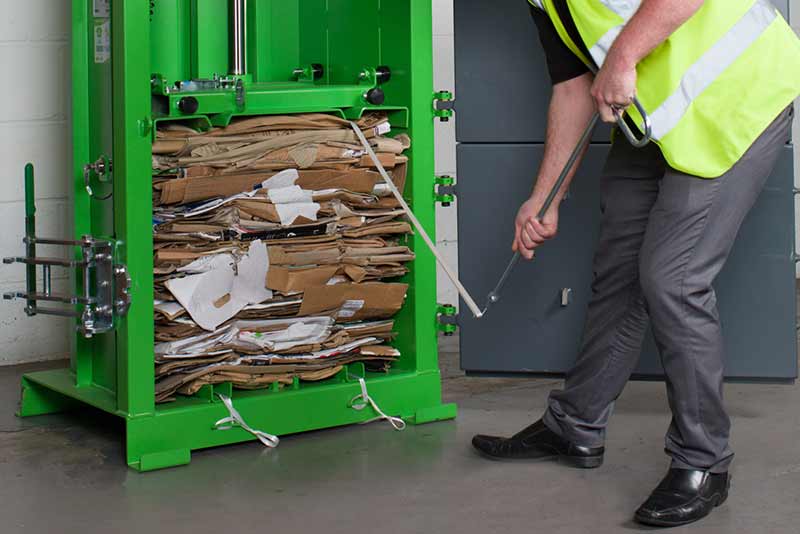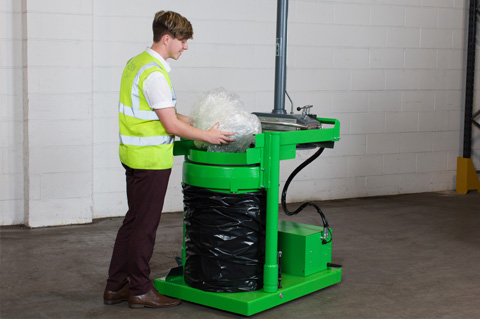Cardboard Balers vs Bin Compactors: Which is Best for Cardboard Waste?
Taking control of your cardboard waste management is a smart investment. As the government turns the spotlight on recycling and landfill tax rises again, recycling cardboard can save you time and money. But is a cardboard baler or waste compactor a better fit for your business?
What is the difference between a cardboard baler and a compactor?
As well as minimising fire and pest hazards and clearing space that can easily become cluttered, recycling your cardboard efficiently can reduce the hours your team spends dealing with waste.
Cardboard compactors and balers both reduce the volume of waste materials, making them easier to recycle.
But there are key differences to consider:
Bailers
Prepare bales of plastics, paper and cardboard, ready for recycling.
Produce neat bales that are easier to store and transport.

Compactors
Handle waste by compacting it, making it easier to dispose of.
Ideal for organisations that want easy waste handling and lower disposal costs.

Read more about the
top 5 reasons to use a baler or compactor and book your
free waste saving audit.Benefits of cardboard balers
Reduced costs: Baled waste requires fewer collections, while recycling reduces your landfill tax.Better storage: Baled cardboard is more space-efficient.Easy handling: Cardboard balers make waste easier to move around.Increased revenue: Businesses can sell bales of cardboard waste to recycling companies for an additional revenue stream.Improved safety: Waste materials that are baled and tied minimise overspills that can cause trips and falls.Benefits of cardboard compactor bins
Versatility: Compactors can handle a wide range of general waste, including old furniture and construction debris. Compactors can also handle small quantities of dry mixed recycling, such as cardboard.Adapted to your needs: Static compactors meet the needs of larger organisations. Portable compactors handle smaller volumes of waste wherever needed.Customisation: Waste compactors can be customised for ease of use.Reduced costs: Compacted waste is space-efficient, requiring fewer collections.Improved hygiene: Using a compactor minimises overflowing bins, pests, and odours, as well as other potential health hazards.What costs do you need to take into account?Finding the right solution for your business isn’t just about the amount of waste you generate. You’ll also need to think about cost factors, both in terms of expenses and potential savings or revenue opportunities.Collection costs vs. rebate incomeOne of the primary advantages of using a compactor is the reduction in your transportation and collection costs. Conversely, selling baled waste can generate a potentially valuable revenue stream, and you could qualify for rebates and incentives for recycling.Equipment hire or purchaseRenting a baler or compactor eliminates the need for upfront investment, helping with short-term cost savings. However, if you generate consistent amounts of waste, buying your equipment outright makes better long-term financial sense.MaintenanceWhether you rent or buy, your equipment must be well-maintained to maximise your ROI. We offer four different
maintenance plans to suit your needs and budget, ensuring seamless operation and extending the lifespan of your baler or compactor.StorageCompacting or baling your waste can free up valuable floor space in your facility. In turn, this leads to improved safety, better operational efficiency and lower storage costs. Read more on
best practices for handling and storing cardboard bales.How to find the best cardboard waste solution for your businessBoth cardboard balers and compactors are excellent choices for compressing, organising and storing waste, saving you time and money. Ultimately, your choice of equipment comes down to budget, waste outputs and business needs.When to choose a cardboard balerA
horizontal baler is ideal for distribution centres that generate large quantities of cardboard for recycling and benefit from easy handling and storage. On the other hand, a
vertical baler is a better fit for a shop with a small footprint, as it facilitates recycling and storage, aligning with your sustainability goals. Restaurants, wholesalers and caterers could also benefit from using a cardboard baler to meet their waste management and recycling needs.When you need a cardboard compactorA static compactor that can handle various waste streams is a great choice for a manufacturing facility, leading to lower disposal costs and better organised floorspace. For an SME, a small footprint
bin and bag compactor can help you manage smaller waste flows, preventing them from piling up.
Hospitality and healthcare facilities can also benefit from significant savings with a cardboard compactor.Cardboard recycling solutions from phs WastekitFind the best way to recycle cardboard with compactors and balers from phs Wastekit. We’ll help you find a waste management solution tailored to your recycling goals, available space, and budget.
Get in touch to discuss our equipment rental and purchase options, and our try-before-you-buy trial.